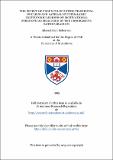The effect of pedunculopontine tegmental nucleus and lateral hypothalamic excitotoxic lesions on motivational strength as measured by the progressive ratio paradigm
Abstract
Motivated behaviours are associated with the nucleus accumbens (NAS). For example, microinjection of J-amphetamine into the NAS results in increased motivated behaviours, and 6-hydroxydopamine lesions attenuate responding for a rewarding stimulus. Two efferent targets of the NAS are the pedunculopontine tegmental nucleus (PPTg) and lateral hypothalamus (LH). Excitotoxic lesions of the PPTg result in deficits in certain incentive-driven behaviours such as conditioned reinforcement. The LH, on the other hand, is involved in more subtle behaviours. LH excitotoxic lesions result in an apparent inability to suppress inappropriate behaviours with regard to food and water intake regulation. LH-lesioned rats do not respond to certain physiological challenges. Thus, both structures are apparently involved in different aspects of motivated behaviours. Motivational strength has not yet been examined in the PPTg and LH. Progressive Ratio (PR) schedules involve a systematic increase in the number of presses on a conditioned lever following each reinforcer delivery. The stage at which responding ceases is called the breaking point (BP) and it is an indicator of motivational strength. This study involved lesioning the PPTg and LH by excitotoxins and testing them on a PR5 schedule. Ibotenate PPTg lesioned rats produced a clear deficit in responding indicated by significantly lower BPs than quinolinate or sham lesioned rats, indicating the possibility that PPTg neurones mediated motivational strength. Ibotenate lesioned rats pressed the non-contingent lever and the panel significantly more often than the other groups. It was hypothesised that these rats were unable to dissociate between the two levers or the panel, and the reward. NMDA lesions of the LH had no effect on motivational strength. They did, however, continually fail to respond appropriately to hypertonic saline. Thus, it seems that by their connections to the NAS, the PPTg and the LH are implicated in motivated behaviours, with only the PPTg being involved in the expression of motivational strength.
Type
Thesis, MPhil Master of Philosophy
Collections
Items in the St Andrews Research Repository are protected by copyright, with all rights reserved, unless otherwise indicated.

